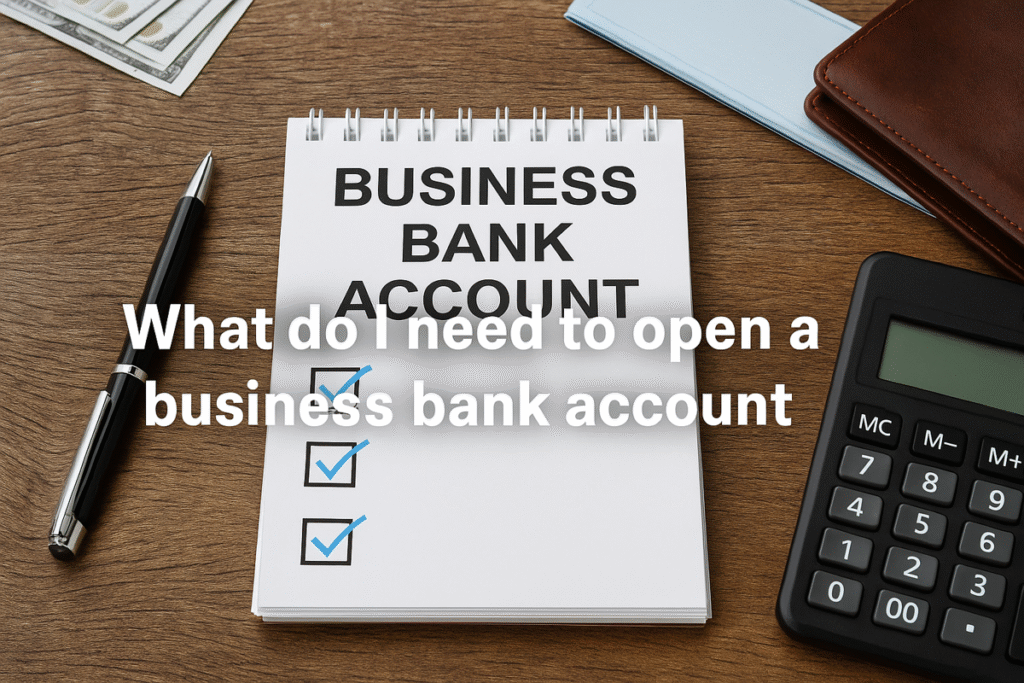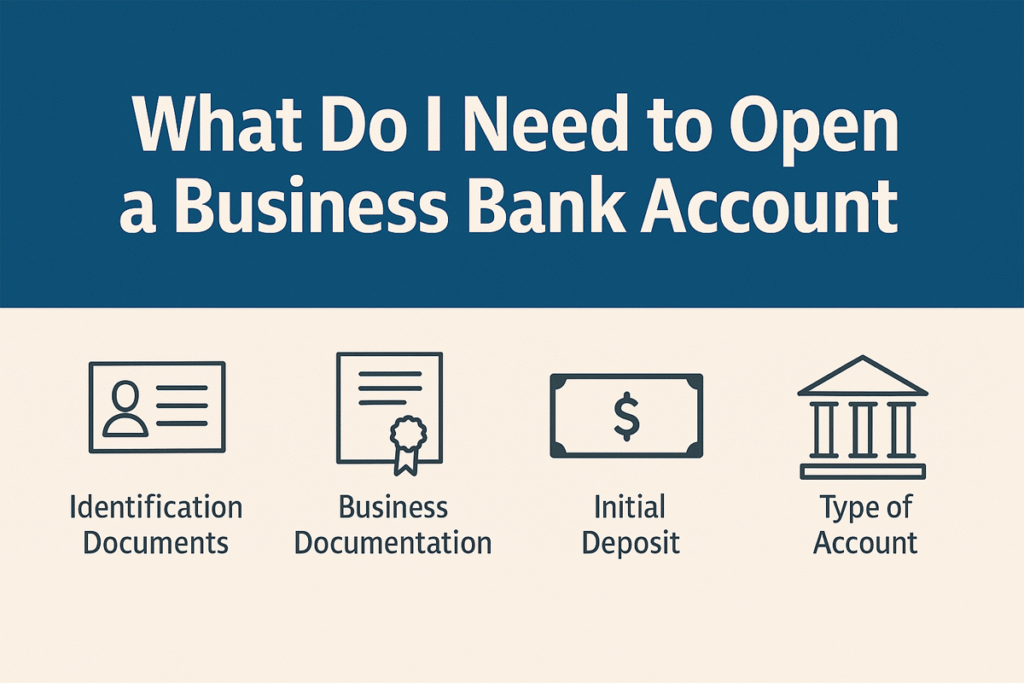Opening a business bank account is an exciting and essential step for any entrepreneur. Whether you’re launching a small online shop, a consultancy, or a full-fledged company, keeping your business finances separate from your personal ones is crucial. But before you walk into the bank or apply online, you might find yourself wondering: what do I need to open a business bank account? This guide will walk you through everything you need, in plain language, so you can open your account with confidence.
Why Opening a Business Bank Account Is Important
Before diving into what you need to open a business bank account, let’s talk about why it’s so important. Many new business owners underestimate the benefits of having a dedicated account. Not only does it help you stay organized, but it also strengthens your credibility.
When your clients or customers write a check or make a payment to your business name, having a business account makes the process seamless. It also simplifies taxes, as all your transactions are in one place, making it easier to track income and expenses. In some cases, certain business structures like LLCs and corporations are even legally required to have separate business bank accounts.
Gathering the Right Identification Documents
One of the first questions most people ask is: what do I need to open a business bank account in terms of identification? Just like opening a personal account, banks need to verify your identity. Typically, this means presenting a government-issued photo ID, such as a driver’s license or passport.
You’ll also be asked to provide proof of your home or business address. This could be a utility bill, tax statement, or even a lease agreement. Some banks might also request your Social Security Number (SSN) if you’re a sole proprietor, or an Employer Identification Number (EIN) if you’ve already registered your business. Knowing what you need to open a business bank account before you show up helps you avoid unnecessary delays.

Proving Your Business Legitimacy
Beyond proving who you are, you’ll also need to prove that your business is legitimate. This is where things can vary, depending on your business type. If you’re a sole proprietor, you may only need a business license or a DBA (Doing Business As) certificate.
If you’ve formed a partnership, LLC, or corporation, you’ll need to show more formal documentation. Articles of Incorporation, partnership agreements, or your business formation certificate are usually required. The bank wants to see that your business is registered and operating legally. So, when you ask yourself, “what do I need to open a business bank account?” keep in mind that these business documents are just as important as your personal ID.
Understanding the Role of an EIN
If you’re running a sole proprietorship, you might think your Social Security Number is enough. In some cases, it is. But many banks prefer, or even require, an Employer Identification Number (EIN), even for sole proprietors.
An EIN is essentially a Social Security Number for your business. It’s issued by the IRS and free to obtain. Having one not only makes you look more professional but also protects your personal information since you won’t have to hand out your SSN to clients and vendors. So, as you research what you need to open a business bank account, consider applying for an EIN if you don’t already have one—it’s fast and easy to get.
Do You Need a Business License?
One of the more confusing aspects of opening a business account is figuring out whether you need a business license. In many states and for many industries, you do. The bank uses your license as proof that you’re authorized to operate.
Even if your business doesn’t require a specific license to function, some banks will still ask for a general business license or permit. Before heading to the bank, check with your local government or business bureau to ensure you have all necessary paperwork. It’s another critical part of answering the question, “what do I need to open a business bank account?”
Initial Deposit Requirements
Now let’s talk about money—specifically, how much you need to deposit when opening the account. Most banks require an initial deposit to activate your business account. This amount can range from as little as $25 to a few hundred dollars, depending on the bank and the type of account.
Having your opening deposit ready shows the bank that you’re serious and ready to do business. It also helps you avoid any delays in accessing your new account. Understanding these financial requirements is a key part of knowing what you need to open a business bank account.
Choosing the Right Type of Business Account
Not all business accounts are created equal. Once you’ve gathered the required documents, the next step is choosing the right account for your needs. Some businesses need only a basic checking account, while others benefit from having both checking and savings accounts.
If you accept card payments, you might also consider a merchant account. The type of account you choose depends on how you plan to manage your cash flow, handle expenses, and save for the future. So, as you figure out what you need to open a business bank account, spend some time thinking about your financial habits and goals too.
What About Online Banks?
In today’s digital world, you’re not limited to traditional brick-and-mortar banks. Online banks have become increasingly popular among small business owners thanks to their convenience, low fees, and easy applications.
Even though the process is digital, the documentation you need remains the same. You’ll still need to upload copies of your ID, business registration documents, and possibly your EIN. So whether you go in-person or online, the question of what you need to open a business bank account still comes down to the same essentials: proving your identity and your business legitimacy.
Setting Up Authorized Signers
Many businesses have more than one person who needs access to the account. If you plan on adding business partners, managers, or employees as authorized signers, you’ll need to provide their information too.
This usually means collecting their IDs and, in some cases, proof of address for each person. Planning for this in advance is a smart move and prevents last-minute stress. It’s another detail to consider when you’re asking yourself, “what do I need to open a business bank account?”
Keeping Personal and Business Finances Separate
One of the biggest reasons to open a business bank account is to keep your personal and business finances separate. Mixing the two can create headaches come tax time and might even jeopardize your legal liability protection if you’re operating as an LLC or corporation.
Having a clear separation makes it easier to track your business expenses, create accurate financial reports, and project your company’s growth. Taking care of your personal health is just as important, and you can also learn how to change up your workout routine to stay energized and focused while running your business. That’s why understanding what you need to open a business bank account is not just about checking off requirements—it’s about laying the foundation for your business’s financial health.
Common Mistakes to Avoid
While it’s important to focus on what you need to open a business bank account, it’s just as important to avoid common pitfalls. One mistake many business owners make is showing up to the bank without all the necessary paperwork. This often leads to wasted time and frustration.
Another mistake is not researching fees and account features beforehand. Some accounts come with high monthly fees or transaction limits that may not suit your business needs. Being prepared and informed ensures you choose the best account and open it without any unnecessary hurdles. For more details, you can also refer to the SBA’s guide to opening a business bank account for authoritative advice.
Wrapping Up: Be Prepared and Confident
By now, you should have a clear understanding of what you need to open a business bank account. From personal identification and business documents to EINs and initial deposits, each piece plays a crucial role in the process. Taking the time to gather everything before you apply—whether online or in person—will save you time and help you avoid frustration.
Remember that opening a business account isn’t just another administrative task. It’s an important milestone that marks your transition from dreamer to entrepreneur. When you know what you need to open a business bank account, you’re setting yourself up for smoother operations, easier tax filing, and stronger financial management. For more helpful tips, news, and resources for entrepreneurs, visit News Time Now and stay informed.

